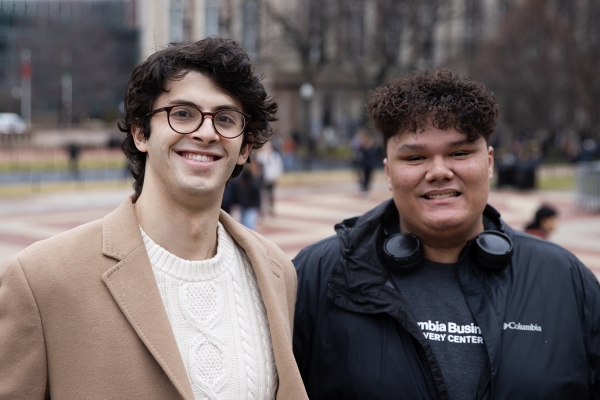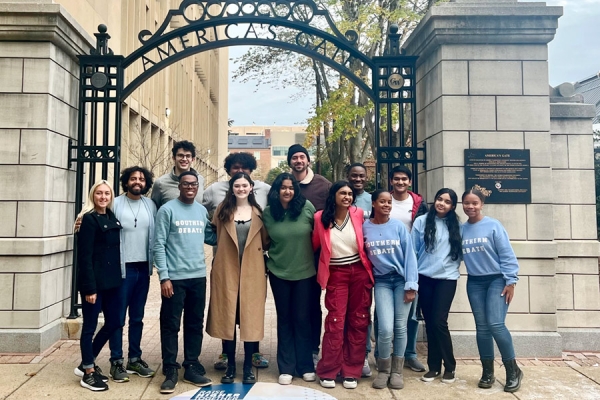
Ben Scherzer CC’24 (left), Debate Society president, and Zoran Curgus CC’26 (right), VP of public affairs
Emma Asher
Think fast. How would you make the case that Taylor Swift should keep dating Travis Kelce? Or: In the event of a zombie epidemic, defend the idea that the undead have a right to a humane life?
These are just a few of the ideas that Columbia Debate Society members have vigorously advocated — or opposed — in the course of argument. From pop culture takes and deliberation on the supernatural to exchanges on more serious topics like finance, government and international affairs, these ardent orators are always ready to make a case.
“It can be anything, so long as there is room for debate on both sides,” society president Ben Scherzer CC’24 says. Part of the fun is when students develop the questions that are debated, whether for practice or competition. “People get to write about their interests,” Scherzer says. “Often it falls along academic lines, but there can be all sorts of hypotheticals: ‘In Harry Potter world, should they lift the rule that says you have to keep it a secret from non-wizards?’”
The society has about 100 members, and a core of 20 to 30 participate on a regular basis. They practice twice during the week and, on weekends, often travel for tournaments at schools up and down the East Coast. While many tournaments are sponsored by the American Parliamentary Debate Association, there are occasional opportunities to compete internationally; during the recent winter break, eight members went to Vietnam for the World University Debating Championship.
True to the APDA name, one of the most common tournament formats is parliamentary; students learn the topic only 15 minutes in advance, then deliver mostly improvised speeches that rely more on quick thinking, analysis and rhetorical abilities than evidence. “A lot of what I get out of participating is beyond it being fun,” Scherzer says. “It takes a lot of skills — clarity of thinking, organized speech, an organized approach to [talking about] things I don’t know much about. I’ve noticed how it’s helped me in school and on job interviews. And I’ve wanted to share that with others.”
Indeed, being ambassadors for debate is a core part of what the society does. While Columbia hosts one tournament for college teams each year, it also hosts two for high school students. In addition, the team involves itself with outreach projects such the Rikers Debate Project (co-founded by Josh Morrison CC’07), which teaches debate to and empowers the voices of the incarcerated.

Columbia Debate Society members met the Southern University team for the first time at a tournament in Washington, D.C.
Courtesy Will Puente
This year, the team has partnered with Southern University in Baton Rouge, La., to help coach its undergraduate debate team. The connection came out of a memorandum of understanding (MOU) signed last year between Columbia and Southern University and A&M College, one of the country’s Historically Black Colleges and Universities, to facilitate collaboration among schools. While the Southern team has a rich history with debate, they stopped competing for about 10 years after the death of their beloved coach, professor Arthur Tolson.
“Here was this great opportunity to help and to share resources,” says Scherzer, referring to the groundwork laid by the MOU. He and Zoran Curgus CC’26, the society’s VP of public affairs, began working with Southern last summer; they then recruited Mukudzeiishe Madzivire CC’27 and Molly Bordoff CC’27 to join their effort.
The Columbia quartet has been Zooming with Southern debaters about once a week: explaining the rules of debate, teaching them how to develop cases, helping them cultivate their speaking and analytical skills. “They are really motivated and really passionate,” Curgus says. The teams met in person for the first time in November in Washington, D.C., where they participated in a tournament together; Southern also traveled to Columbia for its annual tournament in December.
Southern head coach Will Puente, a law student there, says the Columbia students have helped them improve tremendously in the APDA format. He adds: “[The team] is helping bridge the gap in academic exposure in this post-affirmative action era. It is good to see that these undergrads are making a true contribution to diversity, equity and inclusion.”
“The Columbia Debate Society has been a really nice community to be part of,” Curgus says. “You’re involved in the club because you have a deep passion for debate, and you want to see it applied in the competitive aspect, the outreach aspect and the community aspect. That’s the thing that drew me into the club and why I love it to this day.”